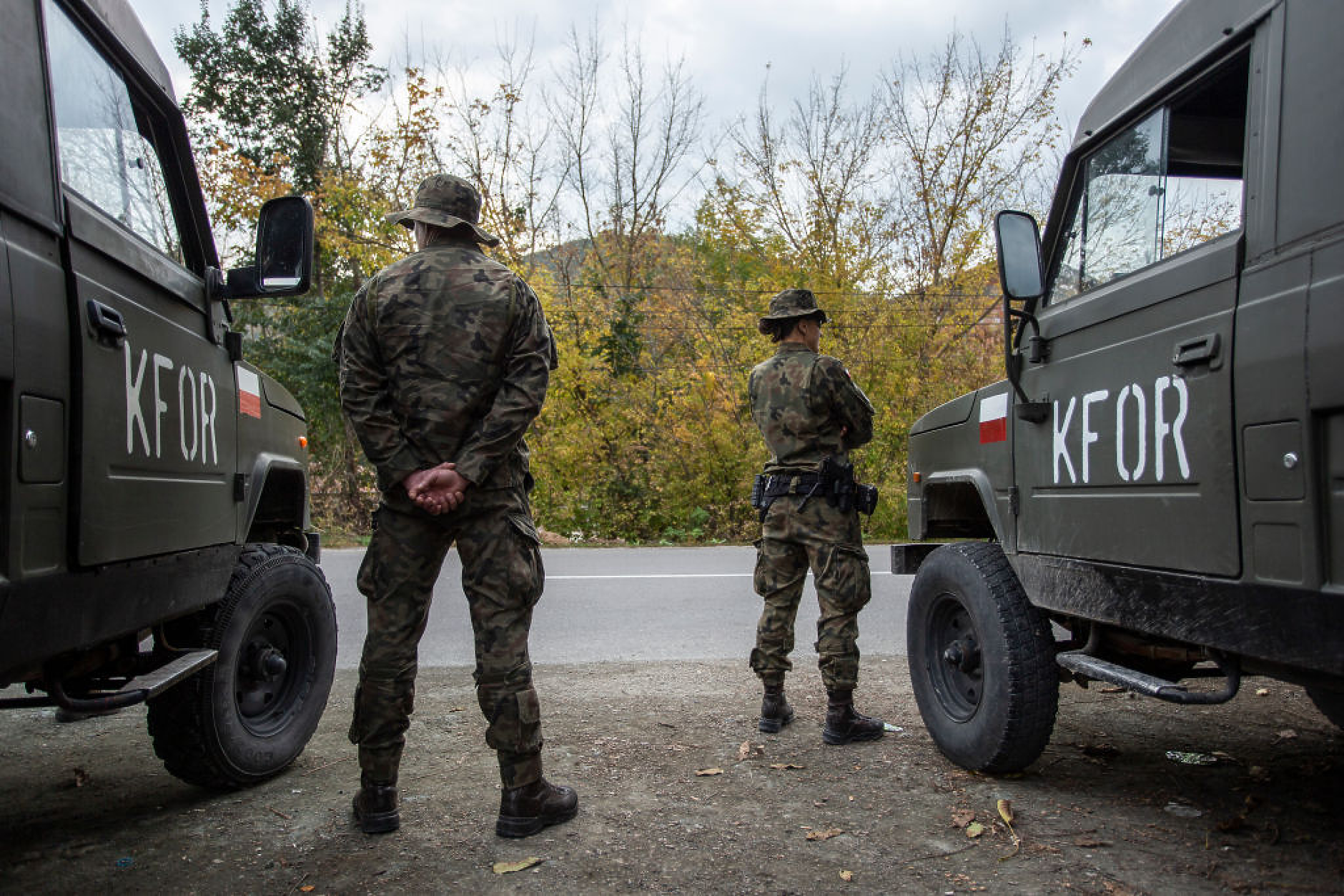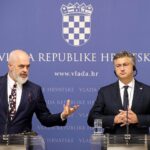Albanian Prime Minister Edi Rama said NATO must regain control of northern Kosovo or face continued violence between ethnic Serbs and ethnic Albanians in the region. The Alliance has announced the deployment of additional forces needed to stabilize the area, while Germany and the UK have already pledged hundreds of soldiers on top of their existing 4,500-strong force to keep the region under control. The Albanian prime minister is pushing for a high-level conference that would gather the leaders of France and Germany and restore U.S. involvement. “It is not easy to change the course of history, it requires leadership. But if France and Germany were able to do it after the Second World War, if Saudi Arabia and Israel can do it now, then we know that it can also happen in the north of Kosovo,” the prime minister of Albania suggested. Rama has long refrained from interfering in the conflict in Kosovo, having managed to establish friendly relations with Belgrade and advocate the accession of Western Balkans’ countries to the EU. But given the rising security threat not only to Albanians in Kosovo, but to the region as a whole, he admitted he had to call a spade a spade. Rama believes that the instability in the Western Balkans primarily serves the interests of Moscow. “The Kremlin would like to see a bit of Donbas in Kosovo and kindle the fire of separatism in the heart of Europe. The Russians are doing it all over the world, from Africa to the Middle East, so they are trying to do the same in Europe, and Kosovo is a convenient tool for the Russians,” the Albanian head of government said.
Acting Prime Minister of Montenegro Dritan Abazović believes that after invading Ukraine, Russia may eventually invade the Western Balkans as well. He emphasized that Podgorica was forced to expel six Russian diplomats who had been engaged in espionage, and joining the anti-Russian sanctions is a principled position for the country, despite the financial losses it incurs in the field of tourism.
The question of accountability for the attack on the Kosovo police patrol in Banjska is not exhausted by the statement of the former vice-chairman of the Serbian List, Milan Radoičić, that he had personally plotted the attack without Belgrade’s knowledge, according to the U.S. Ambassador to Kosovo, Jeff Hovenier. The U.S. is still investigating the incident and believes the attack was not spontaneous but “coordinated” by a group that used military-grade weapons, most of which are of Serbian origin, to destabilize northern Kosovo. The U.S. believes Radoičić ‘s claim that he got the weapons from Tuzla in Bosnia is “interesting”, but it will take time to verify this. The firm position of the American government now is that those responsible for the crime of killing a policeman, for exerting force to seize a religious building, for getting into a shootout with the police and security services of Kosovo, must be brought to justice.
At the General Prosecutor’s Office in Belgrade, Milan Radoičić was interrogated on suspicion that he and several unidentified individuals had committed criminal acts aimed at the illegal weapon handling and and serious acts against public security. As reported by the Prosecutor General’s Office in Belgrade, during the hearing, Radoičić pleaded not guilty. After the hearing, the prosecutor’s office proposed that the suspect be remanded in custody over the risk of him trying to escape. However, Milan Radoičić was released a day after his arrest.
Kosovo Prime Minister Albin Kurti said tentative reports from the Kosovo authorities indicated that most of the people involved in the attack on the Kosovo police patrol in Banjska were part of the organizations “Civil Defense” and “Northern Brigades”. In June, the government of Kosovo declared the two organizations “terrorist”, stressing that they pose a serious and direct threat to the constitutional order and security of Kosovo.
German Chancellor Olaf Scholz said he was determined to find a peaceful solution, and the situation in Kosovo was to be discussed at the summit in Granada. The summit took place on October 6 and was attended by 47 heads of state and government, including Serbian President Aleksandar Vučić and Kosovo President Vjosa Osmani. Publicly, the president of Kosovo snubbed any negotiations with his Serbian counterpart until sanctions are introduced against him. However, the leaders of the European Union and the Western Balkan countries might have had informal meetings in Granada.
Scholz believes that Germany, as well as France and Italy, are particularly active in the search for a peaceful solution. Earlier, German Foreign Ministry spokeswoman Kathrin Deschauer assessed the withdrawal of Serbian troops from the border with Kosovo as an “important step”, but called on Belgrade to do more to ease tensions.
North Macedonia’s Foreign Minister Bujar Osmani said his country should reconsider its participation in the regional Open Balkans initiative if it is proven that Serbia was in any way involved in the attack in northern Kosovo. It was initially a well-intentioned idea, however, after the bloody incident in Kosovo on September 24, Serbia must make an effort to prove that it was not involved because if there was any government-level intervention, it makes it impossible for North Macedonia and other countries in the region to participate in the project because the idea of the “Open Balkans” was primarily about reconciliation.
Thus, the absolute majority of European Union members and the United States advocated a thorough investigation into the deadly shootout in the north of Kosovo and the need to hold accountable both the armed perpetrators and masterminds behind the attack. While Washington, Berlin, and Paris are not in a hurry to draw conclusions about those who orchestrated the actions of the group of Serbs that ambushed the policemen in the north of Kosovo near the Banjska monastery, Pristina has no doubt that it was Belgrade and personally President Aleksandar Vučić of Serbia stand behind the provocation.
Notably, Dragan Šormaz, a former aide to the Serbian president who left the Serbian Progressive Party over ideological differences, believes that Vučić personally planned the armed attack and should now resign. “Vučić’s plan was to create an international protectorate in the north of Kosovo or to annex this territory. The task of Radoičić’s group was to block the access of the Kosovo Special Police to the north,” he said in an interview with the Beta agency.
The president of Kosovo calls for the EU to slam Serbia and Vučić personally with sanctions over the escalation in the north of Kosovo. At the same time, the introduction of such sanctions would actually mean the termination of Serbia’s European integration process. Then it will very likely be forced to ultimately throw itself into Moscow’s arms as the latter is expecting just that. Leading Western politicians have serious suspicions that the entire stunt was organized by Moscow. It is not for nothing that Vučić stated that Belgrade has nothing to do with the events in the north of Kosovo as such developments are unfavorable for Serbia, adding that this must be a third party.
After all, had Serbia plotted anything like that, Vučić suggested it would definitely protect itself from having some compromising footage being filmed from drones.
It is no accident either that just hours into the incident in the north of Kosovo, the president of Serbia met in Belgrade with Russian Ambassador Botsan Kharchenko. Albania’s Prime Minister Edi Rama pointed out that it is Russia that receives the greatest benefit from the escalation. And the fact that the executor of the provocation, Milan Radoičić, declared that he got the weapons not in Serbia, but allegedly in Bosnia’s Tuzla, raises many additional questions. Over the past year, Radoičić has been in Bosnia only once, and it was not Tuzla, but Banja Luka. Considering that the president of the Republika Srpska serves as Moscow’s extended arm in the Balkans, he could have actually provided some weapons to Radoičić, of course with Russia’s backing. And the Bosnian trail shows that the Kremlin planned to simultaneously escalate the situation in Bosnia through Dodik, and in the north of Kosovo – through Radoičić, in order to create two serious conflicts at once, which the EU and the U.S. would have a harder time dealing simultaneously.
If these facts are confirmed, the actions of the Europeans and Americans will be of an appropriate nature and Vučić and Serbia will suffer no sanctions. But in case the plotting of the act of provocation in the north of Kosovo by Belgrade is proven, the president of Serbia and his closest political allies may be hit with sanctions. It is possible that these sanctions may not affect Vučić personally, but the Europeans will be likely to demand that he remove from high offices all those who had a direct relation to the incident, that is, the heads of the Serbian armed forces and security agencies.



